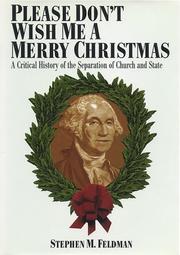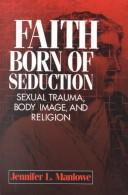| Listing 1 - 3 of 3 |
Sort by
|

ISBN: 0814726372 0814726844 0585002576 0814728049 9780814728048 9780585002576 9780814726372 9780814726846 Year: 1996 Publisher: New York, NY : New York University Press,
Abstract | Keywords | Export | Availability | Bookmark
 Loading...
Loading...Choose an application
- Reference Manager
- EndNote
- RefWorks (Direct export to RefWorks)
Whether in the form of Christmas trees in town squares or prayer in school, fierce disputes over the separation of church and state have long bedeviled this country. Both decried and celebrated, this principle is considered by many, for right or wrong, a defining aspect of American national identity. Nearly all discussions regarding the role of religion in American life build on two dominant assumptions: first, the separation of church and state is a constitutional principle that promotes democracy and equally protects the religious freedom of all Americans, especially religious outgroups; and second, this principle emerges as a uniquely American contribution to political theory. In Please Don't Wish Me a Merry Christmas, Stephen M. Feldman challenges both these assumptions. He argues that the separation of church and state primarily manifests and reinforces Christian domination in American society. Furthermore, Feldman reveals that the separation of church and state did not first arise in the United States. Rather, it has slowly evolved as a political and religious development through western history, beginning with the initial appearance of Christianity as it contentiously separated from Judaism.In tracing the historical roots of the separation of church and state within the Western world, Feldman begins with the Roman Empire and names Augustine as the first political theorist to suggest the idea. Feldman next examines how the roles of church and state variously merged and divided throughout history, during the Crusades, the Italian Renaissance, the Protestant Reformation, the British Civil War and Restoration, the early North American colonies, nineteenth-century America, and up to the present day. In challenging the dominant story of the separation of church and state, Feldman interprets the development of Christian social power vis--vis the state and religious minorities, particularly the prototypical religious outgroup, Jews.
Christianity and antisemitism --- Church and state --- History. --- United States --- Church history --- Politics and government --- Antisemitism and Christianity --- Christianity and other religions --- Judaism --- Controversial literature --- History --- 20th century --- United states

ISBN: 0814755178 0814755291 0814763146 9780814763148 9780814755297 9780814755174 Year: 1995 Publisher: New York, NY : New York University Press,
Abstract | Keywords | Export | Availability | Bookmark
 Loading...
Loading...Choose an application
- Reference Manager
- EndNote
- RefWorks (Direct export to RefWorks)
How do survivors of sexual and domestic violence relate to religion and to a higher power? What are the social and religious contexts that sustain and encourage eating disorders in women? How do these issues intersect? The relationship between Christian religious discourse, incest, and eating disorders reveals an important, and so far unexamined, psychosocial phenomenon. Drawing from interviews with incest survivors whose sexual and religious backgrounds are intimately connected with their problematic relationship with food, Jennifer Manlowe here illuminates the connections between female body, weight, and appetite preoccupations.Manlowe offers social and psychological insights into the most common forms of female suffering—incest and body hatred. The volume is intended as a resource for professionals, advocates, friends of survivors, and most importantly, the survivor of incest herself as she attempts to understand the links of meaning in her mind between her incest experience and her subsequent eating disorder.
Adult child sexual abuse victims --- Incest --- Women --- Eating disorders --- Body image. --- Sexism --- Christianity --- Twelve-step programs --- Religious life. --- Religious aspects --- Christianity. --- Mental health --- Etiology. --- Religious aspects. --- Beeld [Lichaams] --- Body image --- Corps [Image du ] --- Image [Body ] --- Image corporelle --- Image du corps --- Lichaamsbeeld --- Sex bias --- Image, Body --- Disorders of eating --- Eating, Pathological --- Eating disturbances --- Eating dysfunctions --- Pathological eating --- Human females --- Wimmin --- Woman --- Womon --- Womyn --- Adult survivors of child sexual abuse --- Adults sexually abused as children --- Child sexual abuse victims, Adult --- Controversial literature. --- Attitude (Psychology) --- Prejudices --- Sex (Psychology) --- Social perception --- Sex role --- Imagery (Psychology) --- Mind and body --- Person schemas --- Personality --- Self-perception --- Human body --- Appetite disorders --- Psychology, Pathological --- Females --- Human beings --- Femininity --- Sex crimes --- Sexual intercourse --- Consanguinity --- Adult child abuse victims --- Sexual abuse victims --- Sexually abused children --- Controversial literature --- United States --- Religious life --- Etiology --- Adult child sexual abuse victims - United States - Religious life. --- Incest - Religious aspects - Christianity. --- Women - Mental health - United States. --- Eating disorders - United States - Etiology. --- Sexism - Religious aspects - Christianity. --- Twelve-step programs - Religious aspects - Controversial literature. --- Religious aspects&delete&
Book
ISBN: 9004274766 Year: 2014 Publisher: Brill
Abstract | Keywords | Export | Availability | Bookmark
 Loading...
Loading...Choose an application
- Reference Manager
- EndNote
- RefWorks (Direct export to RefWorks)
This collection of essays explores the complex relations between Christians and Muslims at the dawn of the modern age. It begins by examining two seminal works by Nicholas of Cusa: De pace fidei , a dialogue seeking peace among world religions written after the conquest of Constantinople in 1453, and Cribratio Alkorani (1460-61), an attempt to confirm Gospel truths through a critical reading of the Qur’an. After considering Nicholas, his sources, and his context, the book explores a wider range of late medieval texts on Christian-Muslim relations—not only Christian writings about Islam but also Muslim responses to Christianity. The book’s focus is historical, but it can also contribute to efforts at increasing Muslim-Christian understanding today.
Islam --- Christianity and other religions --- Controversial literature --- Relations --- Christianity --- Nicholas, --- Qurʼan --- Criticism, interpretation, etc. --- Chrypffs, Nicolaus, --- Cues, Nicolas de, --- Cues, Nikolaus von, --- Cusa, Nicolaus de, --- Cusano, Nicola, --- Cusano, Nicolò, --- Cusanus, Nicolaus, --- Khrypffs, Nicolaus, --- Krebs, Nicolaus, --- Kues, Nikolaus von, --- Kusánský, Mikuláš, --- Kuzańczyk, --- Kuzaneli, Nikoloz, --- Kuzanskiĭ, Nikolaĭ, --- Mikołaj, --- Mikuláš, --- Ni-ku-la Kʻu-sa, --- Nicholas de Cusa, --- Nicola, --- Nicolai, --- Nicolas, --- Nicolaus Cusanus, --- Nicolò, --- Nikolaĭ, --- Nikolaus, --- Nikolaus von Cusa, --- Nikoloz, --- Nikoloz Kuzanelis, --- Nikula Kʻu-sa, --- Николай, --- Кузанский, Николай, --- Cusano, Niccolò, --- Al-Coran --- Al-Qur'an --- Alcorà --- Alcoran --- Alcorano --- Alcoranus --- Alcorão --- Alkoran --- Coran --- Curān --- Gulan jing --- Karan --- Koran --- Koranen --- Korani --- Koranio --- Korano --- Ku-lan ching --- Ḳurʼān --- Kurāna --- Kurani --- Kuru'an --- Qorān --- Quräan --- Qurʼān al-karīm --- Qurʺon --- Xuraan --- Κοράνιο --- Каран --- Коран --- קוראן --- قرآن --- Early works to 1800. --- Syncretism (Christianity) --- Religions --- Mohammedanism --- Muhammadanism --- Muslimism --- Mussulmanism --- Muslims --- History --- Cusa, Nicolaas van, --- Nicolaas,
| Listing 1 - 3 of 3 |
Sort by
|

 Search
Search Feedback
Feedback About
About Help
Help News
News